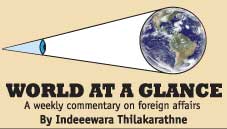|

Arab League denounces civilian killings
The Arab League has sent an "urgent message" to the Syrian
government, denouncing "the continued killings of civilians" taking part
in protests.
The League's ministerial committee on the Syrian crisis also urged
Damascus to "take the necessary measures" to protect civilians.
The call came as at least 37 protesters were killed in Syria,
activists said.
The deaths took place mostly in Homs and Hama as protesters called
for a no-fly-zone to be imposed, activists said.
More than 3,000 people have died in the unrest since protests broke
out in March.
The government of President Bashar al-Assad says the unrest is being
stoked by armed gangs and foreign extremists looking to stir up
sectarian strife.
Foreign journalists have been largely prevented from reporting from
the country, making it difficult to confirm events on the ground.
The Arab League's committee on Syria issued its statement on Friday.
It said that the committee would meet Syrian officials on Sunday in
Qatar to try to reach "serious results" on a way to end the crisis.
The ministers also said that they had held "frank and friendly" talks
with President Assad on Wednesday. Earlier on Friday, protesters in
Syria called for international protection from Nato whose war planes
played a vital role in the overthrow of former Libyan leader Muammar
Gaddafi.
"God, Syria, we want a no-fly zone over it," protesters shouted in
the Bab Tadmur neighbourhood of Homs, while others carried banners
demanding international protection, Reuters reports.
Pakistan Army denies backing Taliban
The Pakistan army has strongly denied claims made in a BBC
documentary that the Pakistani security services are supporting the
Taliban in Afghanistan.
Pakistani army spokesman Major Gen Athar Abbas described the
allegations made by US and Afghan officials as "baseless and malicious".
He claimed that the US and Afghanistan were trying to blame Pakistan
for their own failures.
The first part of the documentary Secret Pakistan aired on Wednesday.
The programme accuses Pakistan of playing a double game, acting as
America's ally in public while secretly training and arming its enemy in
Afghanistan.
'Miserable performance'
Gen Abbas said the ISI (Pakistani secret service) had itself suffered
at the hands of al-Qaeda and its affiliates, saying about 300 officials
had died in attacks.
"You think it is sane for any intelligence operator to harbour people
who'll attack its own men?" he said.
He also claimed that Pakistan was being used as a scapegoat for the
situation in Afghanistan.
"The performance of all intelligence agencies in Afghanistan has been
miserable. That's why they want to dump this on Pakistan and the ISI,"
he said.
"We have the right to take legal action and legal response against
the BBC," he added.
BBC spokeswoman Helen Deller said the documentary was made in line
with BBC editorial guidelines and did "not attempt to take sides".
"Secret Pakistan was made in accordance with the BBC's editorial
guidelines, information we gained was checked with multiple sources and
the programme strove to be fair and accurate."
"The Pakistani position and official response to the allegations made
not only by Western officials and Taliban fighters but also Pakistani
representatives is carried throughout by several different voices."
The US has long suspected Pakistan, or elements within the ISI, of
supporting militant groups in order to increase its influence in
Afghanistan.
Similar claims in the past have been repeatedly denied by Pakistan.
Europe's rescue plan
You can understand the self-congratulation. In the early hours of
October 27th, after marathon talks, the leaders of the euro zone agreed
on a "comprehensive package" to dispel the crisis that has been plaguing
the euro zone for almost two years. They boosted a fund designed to
shore up the euro zone's troubled sovereign borrowers, drafted a plan to
restore Europe's banks, radically cut Greece's burden of debt, and set
out some ways to put the governance of the euro on a proper footing.
After a summer overshadowed by the threat of financial collapse, they
had shown the markets who was boss.
Yet in the light of day, the holes in the rescue plan are plain to
see. The scheme is confused and unconvincing. Confused, because its
financial engineering is too clever by half and vulnerable to unintended
consequences. Unconvincing, because too many details are missing and the
scheme at its core is not up to the job of safeguarding the euro.
Words are cheap...
The summit's most notable achievement was to forge an agreement to
write down the Greek debt held by the private sector by 50%. This
newspaper has long argued for such a move. Yet an essential counterpart
to the Greek write down is a credible firewall around heavily indebted
yet solvent borrowers such as Italy. That is the only way of restoring
confidence and protecting European banks' balance-sheets, thus ensuring
that they can get on with the business of lending.
Unfortunately the euro zone's firewall is the weakest part of the
deal. Europe's main rescue fund, the European Financial Stability
Facility (EFSF), does not have enough money to withstand a run on Italy
and Spain. Germany and the European Central Bank (ECB) have ruled out
the only source of unlimited support: the central bank itself. The euro
zone's northern creditor governments have refused to put more of their
own money into the pot.
Instead they have come up with two schemes to stretch the EFSF. One
is to use it to insure the first losses if any new bonds are written
down. In theory, this means that the rescue fund's power could be
magnified several times. But in practice, such "credit enhancement" may
not yield much. Bond markets may be suspicious of guarantees made by
countries that would themselves be vulnerable if their over-indebted
neighbours suffered turmoil.
Under the second scheme, the EFSF would create a set of
special-purpose vehicles financed by other investors, including
sovereign-wealth funds. |

